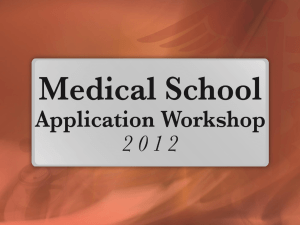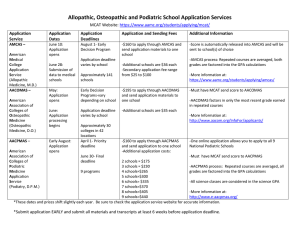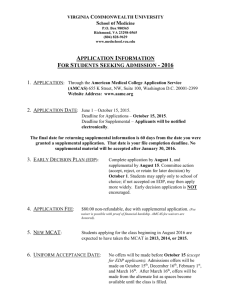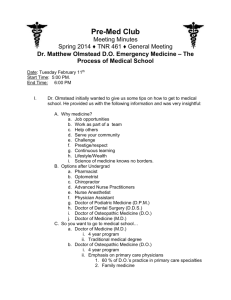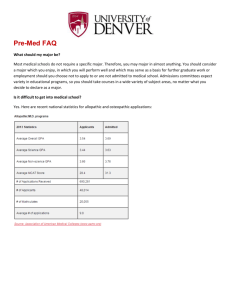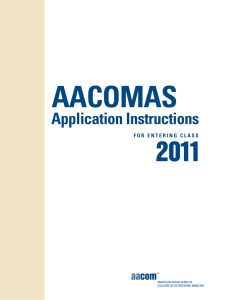Applying to Professional School
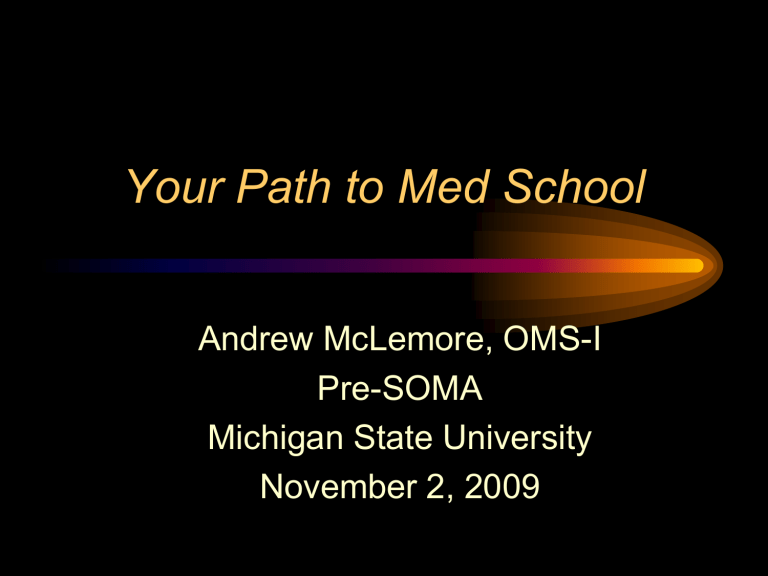
Your Path to Med School
Andrew McLemore, OMS-I
Pre-SOMA
Michigan State University
November 2, 2009
Taking the Osteo-Path
• As you prepare your application, ask yourself these four questions:
– What draws me to my chosen career in health care?
– Am I making an informed career choice?
– Do I have a good head?
– Do I have a good heart?
– Am I prepared to spend the time?
You are your resume!
• Purpose of application process is to tell admissions committee who you are
• More than grades, admission test scores, extracurricular activities
• How do you differentiate yourself from others applying for the same spot?
You are your resume!
• Be ready for the transition:
Student -> Applicant
How to be a Successful Applicant
What draws me to my chosen career in health care?
• Desire to help and to serve is true of all applicants
• Each person has a unique personal journey
• Osteopathic Practices and Principles
• Would make a good introduction to any personal statements you must make on your application
Am I making an informed career choice?
• Do I know what it’s like to be a patient?
– Personal or family experience
• Do I know what it’s really like to be a physician?
– Paid or volunteer activity in serving others
– Keep a journal or blog
– Be a part of relevant communities
Do I have a good head?
• Do I have the intellectual capacity?
– High GPA
– High scores on admission tests
• Do I have an open, creative mind?
– Can you examine all the information, draw a conclusion, and ask if there is another way to look at the problem
– More than being a “walking biochem book”
Do I have a good heart?
• Do I understand the meaning of empathy?
– Must have good interpersonal skills
• Do I appreciate the importance of the doctor-patient relationship?
– Career is built on relationships
– Not the “Dilbert” lifestyle
Am I prepared to spend the time?
• Am I prepared to spend the time required for the practice of my profession?
• Am I prepared to spend sufficient time with each one of my patients to meet his or her needs?
Standardized Test:
The MCAT
Standardized Tests
• Veterinary, PT, OT, masters – GRE
• Dental –DAT
• Optometry - OAT
• Pharmacy -PCAT
• Medical (allopathic and osteopathic) –
MCAT
Standardized Tests
• Usually taken a minimum of 1 year before you plan to matriculate
– This cycle’s test-takers are applying to begin in fall 2011
• Application to medical school is done during summer between junior and senior year.
Preparing for the Exam
• Critical to doing well on the test
• Learn as much about the format and content before you take the first test
• Think of this test as the single most important one in your life
– Do it once, do it right
– Material vs. Methods
Preparing for the Exam
• Make sure you have taken the required courses before attempting the test
• Need an organized, systematic review of the topics
– Form study groups
– Commercial review courses
– Practice exams
– Self-preparation
Preparing for the Exam
• Start studying well before the test date, sometimes as early as 6 months before
• Make getting in “game shape” a routine
• Study 1 to 2 hours/night for the duration
• Do not cram
Applying
Choosing which schools to apply to:
• What type of city do I wish to live in for the next four years?
• Is it important for me to be near friends and family?
• What is the “culture” of the professional school?
• What about financial considerations?
Application Forms and Services
• AACOMAS
– Online, central clearinghouse for DO admissions
– May apply to all 29 osteopathic campuses
• AMCAS
– Parallel system for MD schools
– You may apply to both DO and MD programs
Application Forms and Services
• 11742 applicants in 2008 cycle
Personal Statement or Essay
• Your first chance to go beyond the numbers
• No universal formula
– Personal journey
– Important experiences
– Strengths you possess
– Goals for education and career
– How you will contribute to class diversity
Personal Statement
• Can also be used to explain anything in your background
– Difficult semester
– Bad year due to illness or family problems
• Have your advisor give you critical feedback on essay
• Begin thinking about it now!
Supplemental Application
• Once your target school receives your application and evaluates it, you may be sent a “secondary” application
– Answer more questions
– Another essay (different)
– More $
• DO IT QUICKLY!
Letters of Recommendation
• Will this person write a strong letter?
• Make sure your professors know more about you than your grades
• Have a good mix of science/nonscience professors, volunteer mentors, physicians
• Furnish your evaluator with a resume or list of college activities
Application Timetable
Freshman, Sophomore, Junior
• Visit your advisor each semester
• Take relevant core science courses at a reasonable pace
• Get some experience in your anticipated career and its community
• Perform community service
• Plan to take MCAT
Junior Year (spring)
• Take standardized test
• Keep grades up
– Last chance to make an academic statement
– Upward trend is great
• Register with centralized application services (AACOMAS, AMCAS)
Summer after Junior Year
• Complete application
• Request transcripts from ALL schools be sent to appropriate schools or application service
• Arrange letters of recommendation
Senior Year (Fall Semester)
• Complete supplemental applications
QUICKLY
• Send updated transcript at the end of the semester if requested
• Begin preparation for financial aid
• Go to scheduled interviews
Financing your Education
• In-state/out of state issues
• 98% of professional school students receive some form of assistance
• 86% of graduates have debt this is manageable!
Financing your Education
• Free Application for Federal Student Aid
(FAFSA)
• Grants and Scholarships
• Service Commitment (military, etc)
• Underserved areas
• Loans
-Subsidized vs. unsubsidized
Be Aware of…
• Federal loan limits
• D.O./Ph. D circumstances
• Dependency from parents
• Health Insurance
• Rate of loan repayment
Life in Medical School
First Two Years
• Classroom-Based
• Final dose of Basic Science
• Anatomy, Physiology, Biochem,
Genetics
• Doctor-Patient Relationship, Clinical
Skills, OMM
• COMLEX Level I
Years Three and Four
• Hospital-Based
• Rotations through various disciplines
• Family Medicine, General Surgery,
Internal Medicine, OB/GYN, Orthopedic
Surgery
• COMLEX Level 2-CE and -PE
Internship and Residency
• AOA or ACGME?
• Your first work as a paid physician
– Approximately $45,000 in PGY-1
• PGY-1 through PGY-7
• COMLEX Level 3
• Board Certification
Life as a Med Student
• Work Hard, Play Hard
• Caregivers Must Be Careful
• Lean on Each Other
• Remain Objective
• Be Good to Yourself
• Remember the Number One Symptom
The Two Kinds of Students in
Medical School
• The “next thing to do = 17 th grade
• The “good kind”
What do you mean- Go another way??
• Public Preprofessional Persona
• The Power of Inertia
• The School of Hard Knocks
• It Happened to McLemore
Contacting Me
andrewmclemore@gmail.com
517-803-7324
Facebook: Andrew McLemore
AIM: andrewmclemore
THANK YOU!

